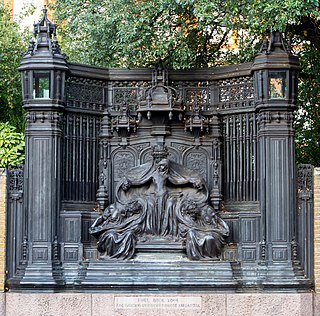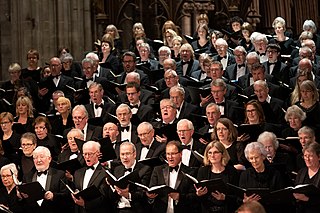
Sir Edward William Elgar, 1st Baronet, was an English composer, many of whose works have entered the British and international classical concert repertoire. Among his best-known compositions are orchestral works including the Enigma Variations, the Pomp and Circumstance Marches, concertos for violin and cello, and two symphonies. He also composed choral works, including The Dream of Gerontius, chamber music and songs. He was appointed Master of the King's Musick in 1924.

John Edward Masefield was an English poet and writer, and Poet Laureate from 1930 until 1967. Among his best known works are the children's novels The Midnight Folk and The Box of Delights, and the poems "The Everlasting Mercy" and "Sea-Fever".

Alexandra of Denmark was Queen of the United Kingdom and the British Dominions, and Empress of India, from 22 January 1901 to 6 May 1910 as the wife of King-Emperor Edward VII.
The Pomp and Circumstance Marches, Op. 39, are a series of five marches for orchestra composed by Sir Edward Elgar. The first four were published between 1901 and 1907, when Elgar was in his forties; the fifth was published in 1930, a few years before his death; and a sixth, compiled posthumously from sketches, was published in 1956 and in 2005–2006. They include some of Elgar's best-known compositions.

The London Symphony Orchestra (LSO) is a British symphony orchestra based in London. Founded in 1904, the LSO is the oldest of London's symphony orchestras. The LSO was created by a group of players who left Henry Wood's Queen's Hall Orchestra because of a new rule requiring players to give the orchestra their exclusive services. The LSO itself later introduced a similar rule for its members. From the outset the LSO was organised on co-operative lines, with all players sharing the profits at the end of each season. This practice continued for the orchestra's first four decades.
Master of the King's Music is a post in the Royal Household of the United Kingdom. The holder of the post originally served the monarch of England, directing the court orchestra and composing or commissioning music as required.

The Queen's Hall was a concert hall in Langham Place, London, opened in 1893. Designed by the architect Thomas Knightley, it had room for an audience of about 2,500 people. It became London's principal concert venue. From 1895 until 1941, it was the home of the promenade concerts founded by Robert Newman together with Henry Wood. The hall had drab decor and cramped seating but superb acoustics. It became known as the "musical centre of the [British] Empire", and several of the leading musicians and composers of the late 19th and early 20th centuries performed there, including Claude Debussy, Edward Elgar, Maurice Ravel and Richard Strauss.
Gordon Percival Septimus Jacob CBE was an English composer and teacher. He was a professor at the Royal College of Music in London from 1924 until his retirement in 1966, and published four books and many articles about music. As a composer he was prolific: the list of his works totals more than 700, mostly compositions of his own, but a substantial minority of orchestrations and arrangements of other composers' works. Those whose music he orchestrated range from William Byrd to Edward Elgar to Noël Coward.

Crown Imperial is an orchestral march by William Walton, commissioned for the coronation of King George VI in Westminster Abbey in 1937. It is in the Pomp and Circumstance tradition, with a brisk opening contrasting with a broad middle section, leading to a resounding conclusion. The work has been heard at subsequent state occasions in the Abbey: the coronation of Queen Elizabeth II in 1953, the wedding of Prince William in 2011 and the coronation of King Charles III in 2023. It has been recorded in its original orchestral form and in arrangements for organ, military band and brass band.

The Sonata in G major, Op. 28 is Edward Elgar's only sonata composed for the organ and was first performed on 8 July 1895. It also exists in arrangements for full orchestra made after Elgar's death.
Was it some Golden Star? is a poem written by Gilbert Parker, published in Volume I of a series of poems called Embers. It was set to music by the English composer Edward Elgar in 1910, as his Op. 59, No. 5.

"The Wind at Dawn" is a poem written by Caroline Alice Roberts, and set to music by the English composer Edward Elgar in 1888.
"The King’s Way" is a poem set to music by the English composer Edward Elgar in 1909. The words were written by his wife, Caroline Alice Elgar.
"Follow the Colours" is a marching song written by the English composer Edward Elgar in 1907, with words by Capt. William de Courcy Stretton. The song is for male voice solo with an optional male voice chorus, accompanied by piano, orchestra or military band.
Coronation Ode, Op. 44 is a work composed by Edward Elgar for soprano, alto, tenor and bass soloists, chorus and orchestra, with words by A. C. Benson.
Pageant of Empire is the title given to a set of songs, to words by Alfred Noyes, written by the English composer Sir Edward Elgar and given important positions in the Pageant of Empire at the British Empire Exhibition at Wembley Park.

From the Bavarian Highlands, Op 27 is a work for choir and orchestra by Edward Elgar.

The Queen Alexandra Memorial on Marlborough Road, London, which commemorates Queen Alexandra, was executed by the sculptor Sir Alfred Gilbert between 1926 and 1932. It consists of a bronze screen incorporating allegorical figures, set into the garden wall of Marlborough House and facing St James's Palace. A late example of a work in the Art Nouveau style, it was regarded by the sculptor as his "Swan song".

Worcester Festival Choral Society (WFCS) is an independent, SATB (soprano, alto, tenor, bass) choir of around 150 amateur singers that presents classical choral concerts at Worcester Cathedral, Worcester. The conductor is Samuel Hudson (Worcester Cathedral’s Director of Music) and the accompanist is Nicholas Freestone (Worcester Cathedral’s Assistant Director of Music). The Chairman is Susan White. The President is The Lord Bishop of Worcester and Senior Vice President is The Dean of Worcester.











